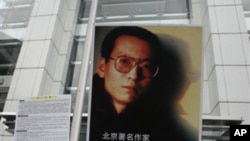Chinese Nobel Prize winner Liu Xiaobo’s writings will soon get an additional airing in the West.
Perry Link, a leading U.S. scholar on modern Chinese literature, plans to release a series of essays and poems by Liu. “No Enemies, No Hatred,” will be published by Harvard University Press in January 2012.
Link says Liu has been fearless in advocating reforms in China.
“He’s had that psychology for a while that you can ‘put me in prison…but I am still going to say what I like,’” Link says.
The book will show that Liu’s poetry, despite covering a variety of subjects, is informed primarily by a concern for political progress and freedom in his homeland.
“He really does want to have an open, free press and right of assembly, a multi-party electoral democracy and all of these things that the leaders of the Communist Party are afraid of,” Link says.
Hear Dave DeForest interview Professor Perry Link about Liu's poetry:
It was just a year ago that Liu joined the ranks of other persecuted democracy activists who have been awarded the Nobel Peace Prize.
Liu was not allowed to pick up his prize in person because he was in China’s Jinzhou Prison, serving an 11-year sentence for “incitement to subvert state power”—meaning he had written things the government didn’t like.
His problems with the government began after the Tiananmen Square massacre of democracy protesters in 1989. Then a college professor, he published poems and articles advocating human rights and freedom of expression in China. These were not well received by a government fearful of losing it tight grip on power, and Liu was fired from his job at Beijing Normal University.
His writings have since landed him in jail four times.
Hear a brief reading by Professor Perry Link of Liu's poetry:




